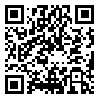شمارۀ جدید فصلنامه (زمستان 1403) منتشر شد
BibTeX | RIS | EndNote | Medlars | ProCite | Reference Manager | RefWorks
Send citation to:
URL: http://jspi.khu.ac.ir/article-1-2647-en.html
Increased social distrustfulness in community lead to the growth of individualistic activities and reduced collective activities and thereby is a threat for social cohesion. Social trust is the main capital of any society, ignoring it constitutes distance from a healthy society and thus increase in distrustfulness. Present study aimed to do a comparative survey of cultural duality and its relationship with social distrustfulness in Yazd and Ahwaz. Statistical population of this research(survey) are individuals from 15 to 64 years residing in Yazd and Ahwaz which among them a sample of 600 subjects were selected by cluster sampling. Results suggest that there is a significant relation between cultural duality and social distrustfulness. This means that if traditional and modern values simultaneously appear in individuals’ behaviors and their social actions, consequently distrustfulness increases. Data shows that maximum amount of social distrust in environmental and institutional aspects are more than other aspects and this amount among Yazd citizens is higher than Ahwaz citizens. Results of regression analysis showed that, dimensions of equality, democracy, pluralism, civil society and appreciate can respectively explain 21.2% of social distrustfulness changes. Overall, results of present study show that, cultural duality is one of the factors of increasing distrust in interactive, social and political arenas.
Received: 2017/01/16 | Accepted: 2017/01/16 | Published: 2017/01/16
| Rights and permissions | |
 |
This work is licensed under a Creative Commons Attribution-NonCommercial 4.0 International License. |






